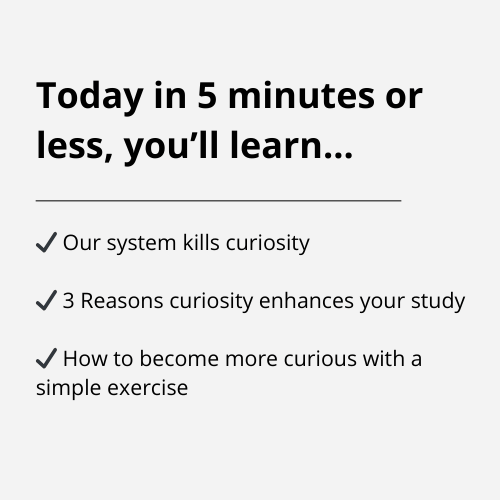- Verve Newsletter
- Posts
- Why curiosity is good for us
Why curiosity is good for us
How curiosity improves our study
Hello Enthusiasts of knowledge,
Have you ever wondered what role curiosity plays in studying?
Did you know that increasing curiosity also helps you in your studies? In fact, more than just "helping," it drastically increases efficiency in studying!
Too often, we find ourselves trapped in a mechanical study cycle, devoid of passion and genuine interest. However, when we manage to awaken our intrinsic curiosity, we radically transform our learning experience.
Today we're here to discover how to harness our curiosity.

Our system kills curiosity
In our school system, curiosity is often neglected, if not completely ignored, in the educational process. Too often, the focus is on memorizing facts rather than deeply understanding the subjects, leaving students without incentives to explore and ask questions.
Many schools place little emphasis on creative exploration, preferring a teaching approach based on textbooks and frontal lessons. However, this approach limits students' opportunities to follow their curiosity and experiment through creative and practical activities.
But losing our natural curiosity means giving up the numerous benefits it offers:
3 reasons why curiosity improves your study:
Here are three benefits we derive from allowing ourselves to be more curious during our study sessions:
1. Improves attention and information absorption: When we are genuinely curious about a topic, we are naturally more inclined to focus on it and absorb information more effectively. Curiosity acts as a powerful driver that motivates us to explore and better understand topics, making studying more engaging and rewarding.
2. Stimulates creativity and problem-solving: Being curious prompts us to ask questions and continually seek answers. This process of inquiry stimulates our creativity and drives us to find innovative solutions to problems. When fueled by curiosity, we are more likely to explore new perspectives and deepen our understanding, thereby enhancing the quality of our study and ideas.
3. Fosters motivation and perseverance: Curiosity keeps us motivated and encourages us to persevere even in the face of challenges. When we are passionate about what we are learning, we are more likely to overcome obstacles and persist in our study journey. Curiosity nourishes us with energy and determination, helping us maintain our passion for learning.
How to become more curious
Our curiosity isn't innate, as we tend to believe. Sure, some individuals are more curious than others, but curiosity is trainable.
I like to think of it as a muscle; if trained, it grows, if nurtured, it remains, and it becomes stronger and more energetic. But if we forget to use it, we slowly lose it.
When studying mechanically, we often completely lose curiosity about what we're studying. We study because we have to, not even considering the idea that the topic might interest us.
Linked with this, we easily disconnect the act of studying from the pleasure of discovering things that interest us and help us grow, consequently losing motivation.
It's important to nurture our curiosity, especially to continue linking the act of studying with the means of discovering new and interesting things. By reconnecting studying with the satisfaction of satisfying your curiosity, a new motivation and energy will be part of your study sessions.
How can you avoid losing this great source of motivation and regain curiosity?
The exercise I find most useful is definitely exploring a new topic every week. Dedicate some time each week to explore a completely new topic for you. It could be a current affairs topic, a new skill, or a hobby you've always wanted to try. Do some research, read articles, watch videos on YouTube, participate in workshops, or take online courses. The goal isn't to become an expert but simply to expand your knowledge and stimulate your curiosity. At the end of the week, reflect on what you've learned, what interested you the most, and what you might want to explore further. This exercise will help you keep your curiosity alive and open your mind to new experiences and learning opportunities.
Cultivating your curiosity every week is easy, and the benefits in terms of motivation, interest, energy, and concentration are truly invaluable.
This week's challenge: Explore your curiosity a little bit.
Carve out a couple of hours from your schedule, even on separate days, to dedicate to nurturing your curiosity. You might even discover new things about yourself and what you're passionate about 😉.
Don't forget to cultivate your curiosity every day and to be inspired by the wonders of the world around you.
Reply to this email to let me know how it goes.
Talk to you soon,
Isa